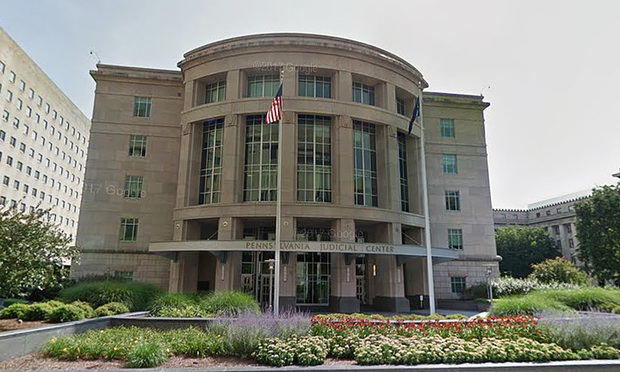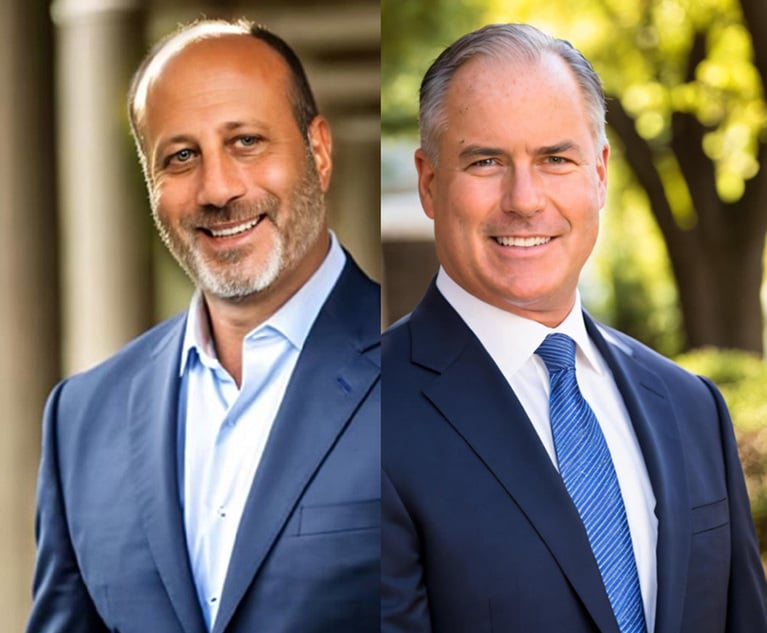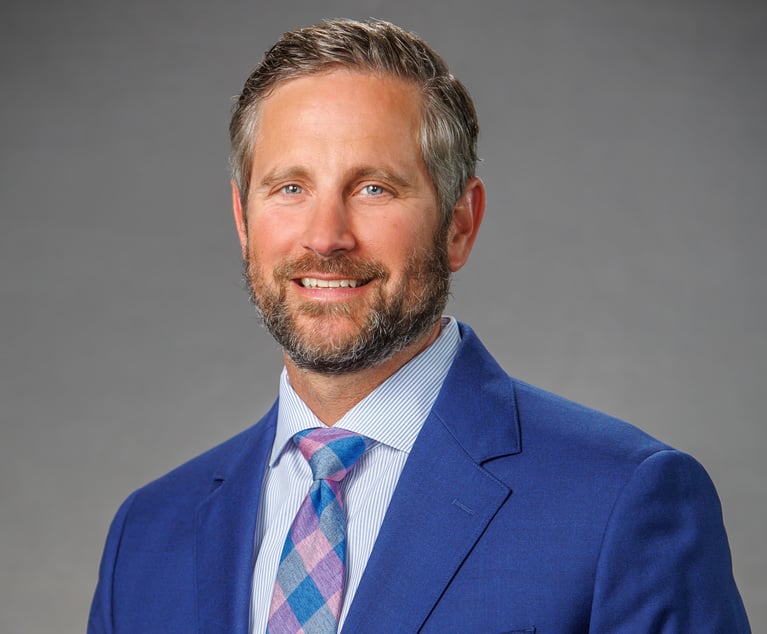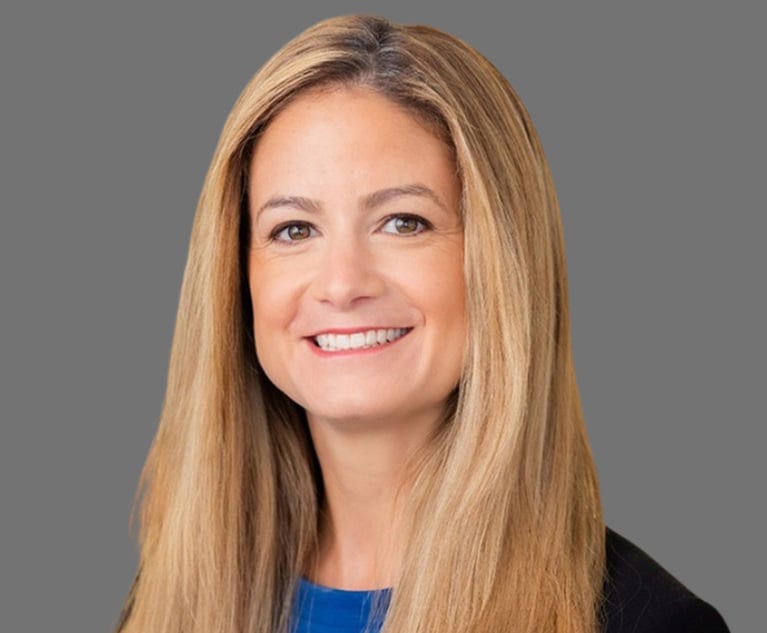Democratic Superior Court Hopefuls Outpace GOP Fundraising for November Election
Fueled largely by contributions from organized labor and trial lawyers, the campaigns of Democrats Dan McCaffery and Amanda Green-Hawkins have assembled slightly larger war chests than have Republicans Megan King and Christylee Peck, whose committees have received boosts from the state party organization and at least one conservative-leaning political action committee.
October 07, 2019 at 03:08 PM
6 minute read
 Superior Court of Pennsylvania, 601 Commonwealth Ave No. 1600, Harrisburg. Photo: Google
Superior Court of Pennsylvania, 601 Commonwealth Ave No. 1600, Harrisburg. Photo: Google
The two Democratic candidates running for spots on the Pennsylvania Superior Court have edged out their Republican counterparts in terms of overall money raised so far this election season.
Fueled largely by contributions from organized labor and trial lawyers, the campaigns of Democrats Dan McCaffery and Amanda Green-Hawkins have assembled slightly larger war chests than have Republicans Megan King and Christylee Peck, whose committees have received boosts from the state party organization and at least one conservative-leaning political action committee.
According to the latest numbers from the Pennsylvania Department of State, Democratic candidates McCaffery, a Philadelphia Court of Common Pleas judge, and Green-Hawkins, associate counsel to the United Steelworkers union, have raised a combined $653,820 since the start of the year.
That gave them a slight lead over the $601,844 raised by Republican nominees King, a Chester County deputy district attorney, and Peck, a Cumberland County Court of Common Pleas judge.
Although the two parties are close when it comes to their candidates bringing in money this year, McCaffery's committee has been the clear front-runner when it comes to individual fundraising.
According to the records, McCaffery has brought in nearly $440,000 since mid-September. Much of that support, records show, comes from labor union-aligned political action committees and Philadelphia trial attorneys.
King, a Chester County assistant district attorney, is the second-highest fundraiser, according to the records. As of mid-September, she raised nearly $304,000, with much of the support coming from PACs and law firms across the state. She also received a significant boost of in-kind support from the Republican party.
Peck was close behind King, bringing in nearly $298,000 by mid-September. She also found support from PACs and midstate lawyers, as well as the Republican party.
Green-Hawkins has raised the least money so far. According to records, she raised $213,980 this year. Although she found some support through a lawyer-backed PAC, the majority of Green-Hawkins' donors were from unions, records showed.
Political analyst G. Terry Madonna, director of the Center for Politics and Public Affairs at Franklin & Marshall College, said off-year elections consistently have the lowest turnout and often depend on which party can drive more of their voters to the polls. According to Madonna, that's because judicial races are low-information campaigns, so voters have little to go on other than party affiliation. He pointed to ethical rules preventing judicial candidates from discussing issues that might come before them and low fundraising numbers as the biggest contributing factors, he said.
"The only way to be effective in Pennsylvania and to get your name out there is to do media. How do you do that with that kind of money?" he asked. "They would need double, or triple what's been raised so far."
With that in mind, he said, these elections, especially in years where there are few local ballot issues driving voters to the polls, are very difficult to predict.
"These are very important courts, and they draw the least amount of interest," Madonna said.
When it comes to which groups have been supporting the candidates so far, Madonna said he is not surprised. Although, he said, having the Republican party devote markedly more resources into their candidates' war chests may signal that the party has learned a lesson from the 2015 Pennsylvania Supreme Court race, when three Democratic candidates were swept into office after significantly out-fundraising their Republican rivals.
"The bottom line is the Republicans certainly understand in this case that holding onto a couple of seats on the Superior Court is extremely important," Madonna said.
The state Republican Party donated more than $105,000 in in-kind contributions to each of King's and Peck's campaigns, making the party each of their largest donors.
The biggest single donation so far was a $100,000 contribution made in August to McCaffery's campaign. The Committee for a Better Tomorrow, which is the PAC for the Philadelphia Trial Lawyers Association, made the donation.
The trial bar's support of McCaffery did not stop there, as many high-profile litigators threw their individual support behind the judge as well. According to state records, McCaffery received nearly 80 individual contributions from attorneys and firms, ranging from $250 to $2,500. Attorneys Robert Mongeluzzi, Dion Rassias and Jim Beasley Jr. each made individual contributions of $2,500, as did the firms Ross Feller Casey and Fox Rothschild.
Mongeluzzi's firm, Saltz Mongeluzzi Barrett & Bendesky, was a big supporter, with attorneys contributing a total of $7,500. Attorneys from Pietragallo Gordon Alfano Bosick & Raspanti also contributed a total of $5,000, as did attorneys from Ross Feller and The Beasley Firm.
McCaffery also received significant support from unions, earning a total of $66,500 from International Brotherhood of Electrical Workers union chapters.
The biggest supporters of Green-Hawkins were labor unions. According to the numbers, United Steel, which she works for as associate counsel, was her single largest donor, contributing $52,000 to her campaign. IBEW and Steamfitters unions were also leading backers.
Green-Hawkins' second-largest donation came from the Committee for a Better Tomorrow, which donated $50,000. The law firm that was the biggest contributor to her campaign was Feinstein Doyle Payne & Kravec, which contributed $2,000.
The Republican candidates did not gain much support from unions, but they both received some support from the trial lawyers' PAC, with Peck receiving a $25,000 donation and King securing a $10,000 contribution.
The two also received significant support from the conservative PAC Commonwealth Leaders Fund. According to records, the group donated $50,000 to each Republican candidate.
The lawyer to provide the most financial support for King was King herself, donating $25,000 to her campaign in July, and a total of $30,000 overall. Dillon McCandless King Coulter & Graham was the next largest firm contributor, donating $6,500.
As for Peck, she also provided her campaign with the largest donation of any attorney with a $2,500 contribution. McNees Wallace & Nurick provided the largest donation from a firm, with $2,250.
This content has been archived. It is available through our partners, LexisNexis® and Bloomberg Law.
To view this content, please continue to their sites.
Not a Lexis Subscriber?
Subscribe Now
Not a Bloomberg Law Subscriber?
Subscribe Now
NOT FOR REPRINT
© 2025 ALM Global, LLC, All Rights Reserved. Request academic re-use from www.copyright.com. All other uses, submit a request to [email protected]. For more information visit Asset & Logo Licensing.
You Might Like
View All



Trending Stories
- 1'Not the President's Personal Lawyer': Lawyers Share Concerns Over How AG Pick Bondi’s Loyalism to Trump May Impact DOJ
- 2US Judge OKs Partial Release of Ex-Special Counsel's Final Report in Election Case
- 3The Demise of Truth and Transparency in Federal Sentencing
- 4Former Phila. Solicitor Sozi Tulante Rejoins Dechert
- 5'I've Seen Terrible Things': Lawyer Predicts Spike in Hazing Suits
Who Got The Work
Michael G. Bongiorno, Andrew Scott Dulberg and Elizabeth E. Driscoll from Wilmer Cutler Pickering Hale and Dorr have stepped in to represent Symbotic Inc., an A.I.-enabled technology platform that focuses on increasing supply chain efficiency, and other defendants in a pending shareholder derivative lawsuit. The case, filed Oct. 2 in Massachusetts District Court by the Brown Law Firm on behalf of Stephen Austen, accuses certain officers and directors of misleading investors in regard to Symbotic's potential for margin growth by failing to disclose that the company was not equipped to timely deploy its systems or manage expenses through project delays. The case, assigned to U.S. District Judge Nathaniel M. Gorton, is 1:24-cv-12522, Austen v. Cohen et al.
Who Got The Work
Edmund Polubinski and Marie Killmond of Davis Polk & Wardwell have entered appearances for data platform software development company MongoDB and other defendants in a pending shareholder derivative lawsuit. The action, filed Oct. 7 in New York Southern District Court by the Brown Law Firm, accuses the company's directors and/or officers of falsely expressing confidence in the company’s restructuring of its sales incentive plan and downplaying the severity of decreases in its upfront commitments. The case is 1:24-cv-07594, Roy v. Ittycheria et al.
Who Got The Work
Amy O. Bruchs and Kurt F. Ellison of Michael Best & Friedrich have entered appearances for Epic Systems Corp. in a pending employment discrimination lawsuit. The suit was filed Sept. 7 in Wisconsin Western District Court by Levine Eisberner LLC and Siri & Glimstad on behalf of a project manager who claims that he was wrongfully terminated after applying for a religious exemption to the defendant's COVID-19 vaccine mandate. The case, assigned to U.S. Magistrate Judge Anita Marie Boor, is 3:24-cv-00630, Secker, Nathan v. Epic Systems Corporation.
Who Got The Work
David X. Sullivan, Thomas J. Finn and Gregory A. Hall from McCarter & English have entered appearances for Sunrun Installation Services in a pending civil rights lawsuit. The complaint was filed Sept. 4 in Connecticut District Court by attorney Robert M. Berke on behalf of former employee George Edward Steins, who was arrested and charged with employing an unregistered home improvement salesperson. The complaint alleges that had Sunrun informed the Connecticut Department of Consumer Protection that the plaintiff's employment had ended in 2017 and that he no longer held Sunrun's home improvement contractor license, he would not have been hit with charges, which were dismissed in May 2024. The case, assigned to U.S. District Judge Jeffrey A. Meyer, is 3:24-cv-01423, Steins v. Sunrun, Inc. et al.
Who Got The Work
Greenberg Traurig shareholder Joshua L. Raskin has entered an appearance for boohoo.com UK Ltd. in a pending patent infringement lawsuit. The suit, filed Sept. 3 in Texas Eastern District Court by Rozier Hardt McDonough on behalf of Alto Dynamics, asserts five patents related to an online shopping platform. The case, assigned to U.S. District Judge Rodney Gilstrap, is 2:24-cv-00719, Alto Dynamics, LLC v. boohoo.com UK Limited.
Featured Firms
Law Offices of Gary Martin Hays & Associates, P.C.
(470) 294-1674
Law Offices of Mark E. Salomone
(857) 444-6468
Smith & Hassler
(713) 739-1250





